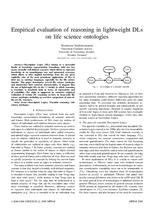Empirical evaluation of reasoning in lightweight DLs on life science ontologies
From International Center for Computational Logic
Empirical evaluation of reasoning in lightweight DLs on life science ontologies
Boontawee SuntisrivarapornBoontawee Suntisrivaraporn
Boontawee Suntisrivaraporn
Empirical evaluation of reasoning in lightweight DLs on life science ontologies
Proceedings of the 2nd Mahasarakham International Workshop on AI (MIWAI'08), 2008
Empirical evaluation of reasoning in lightweight DLs on life science ontologies
Proceedings of the 2nd Mahasarakham International Workshop on AI (MIWAI'08), 2008
- KurzfassungAbstract
Description Logics (DLs) belong to a successful family of knowledge representation formalisms with two key assets: formally well-dned semantics which allows to represent knowledge in an unambiguous way and automated reasoning which allows to infer implicit knowledge from the one given explicitly. One of the most prominent applications of DLs is their use as ontology languages, especially for the life science domain. This paper investigates several life science ontologies and summarizes their common characteristics. It suggests that the use of lightweight DLs in the EL family, in which reasoning is tractable, is bencial both in terms of expressivity and of scalability. The claim is supported by extensive empirical evaluation of various DL reasoning services on large-scale life science ontologies, including an overview comparison of state-ofthe-art DL reasoners. - Forschungsgruppe:Research Group: AutomatentheorieAutomata Theory
@inproceedings{ Sun-MIWAI-08,
author = {Boontawee {Suntisrivaraporn}},
booktitle = {Proceedings of the 2nd Mahasarakham International Workshop on AI (MIWAI'08)},
title = {Empirical evaluation of reasoning in lightweight {DLs} on life science ontologies},
year = {2008},
}
